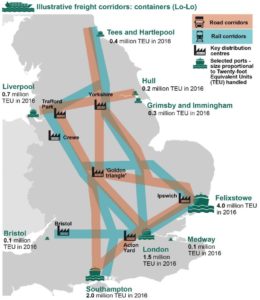
This week, the UK government has published the Department for Transport’s report on port connectivity, entitled “Transport infrastructure for our global future: a study of England’s port connectivity”. The analysis aims at examining the current level of access to ports, the key transport and economic corridors serving ports, how port connectivity issues are managed and what development plans and ambitions ports have for the future.
The government study starts with recognizing the vital role of ports in the national economy. Currently, around 95% of all goods entering and leaving Britain are moved by sea, the remaining small part – by air or the channel tunnel and a negligible tonnage by pipe. The port sector directly contributes UKP 1.7 bln to the UK economy, and together with other factors, such as supply chain, taken into consideration, the port sector’s economic contribution to the UK is estimated to be UKP 5.4 bln per annum. And this role is to increase in future.
Out of 81 ports in England three-quarters of the total tonnage is handled by the 7 largest ports, including London, Liverpool, Immingham, Felixstowe, Southampton, Teesport and Milford Haven. The cargo moved in and out of ports is delivered largely by road. Road freight transport accounts for 76% of all domestic freight movements in the UK, with 9% of movements by rail and 15% by water.
Being a key destination for global trade, England needs to have appropriate capacity on its inland transport network, to and from its international gateway ports, to meet future demand. This especially concerns rail connections, as improved rail links could provide more cost-effective transportation between key economic areas and ports, which would in turn boost productivity, provide lower costs and give access to international markets.
Announcing the publication of the study, Maritime Minister Nusrat Ghani says: “As part of a wider commitment, UK government is making investment totalling over UKP 60 bln to improve the national transport networks as a whole, including freight connectivity.”
The report has been developed with input from Network Rail, Highways England, the port and wider freight industry, and its customers.
It makes a series of recommendations across a number of priority areas, such as ensuring ports’ needs are fully factored into cross-government decision-making; enriching communications between all the involved parties; and making sure that the long-term vision for the port sector is fully captured in ‘Maritime 2050’ strategy.
Nusrat Ghani says in the foreword to the Study: “This Study is a first step in ensuring the government at a national and local level, the port industry, transport delivery bodies, the wider freight industry and their customers work ever closer together to ensure we make the right decisions for our future trading success.”
